Lijia Zhang's Blog
November 23, 2025
Royal Pavilion
The Royal Pavilion in Brighton – An Odd “Chinese-Looking” Thing
Brighton’s most iconic landmark, the Royal Pavilion, is an exotic, palace-like residence built as King George IV’s seaside pleasure retreat in the early 19th century. Not everyone admired it. Queen Victoria famously remarked: “The Pavilion is a strange, odd Chinese-looking thing, both inside and outside; most rooms low, and I only see a little morsel of the sea from one of my sitting-room windows.”
In reality, the exterior is Indo-Saracenic, loosely inspired by the Taj Mahal, while the interiors are decorated in a Chinese style. I found some of the supposedly Chinese figures odd-looking indeed: Western imaginings of what “Chinese” meant at the time. The result is an imposing building that blends fantasy, eccentricity and royal extravagance.
The Pavilion later served as a military hospital during the First World War, treating wounded Indian soldiers. Today, it stands as a beautifully restored museum and a vivid reminder of Britain’s Regency era.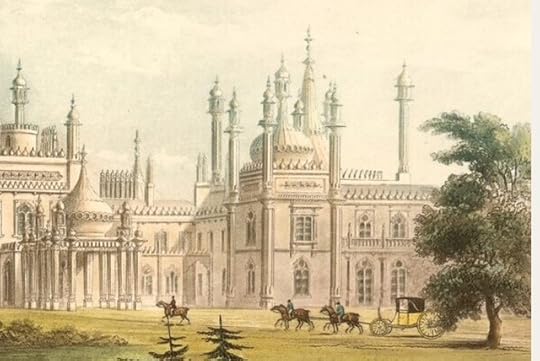
November 22, 2025
My review of a station on the path to somewhere better
My Review of A Station on the Path to Somewhere Better by Benjamin Wood
Apart from tackling classic or well-established novels, I also try to read good work by emerging writers. Recently, I read A Station on the Path to Somewhere Better and loved it. It is a dark, gripping coming-of-age story following 11-year-old Daniel Hardesty as he embarks on a road trip with his estranged and unstable father, Francis. What begins as a hopeful attempt at reconnection descends into psychological manipulation, violence, and a traumatic crime that will shape Daniel’s life forever. The narrative moves between the journey itself and its aftermath, tracing how Daniel struggles to understand, survive, and ultimately break free from the emotional legacy of his father.
Wood’s novel is tense, atmospheric, and emotionally devastating. It blends psychological suspense with literary depth, and its greatest strength is the portrayal of the father–son relationship and the intoxicating charm and terrifying volatility of Francis, the father. The prose is elegant and controlled, with a strong sense of place and a slow, creeping escalation that keeps readers constantly unsettled.
I was shocked by the violent climax, but it works. The novel is ultimately a powerful exploration of trauma, guilt, and the long shadow of childhood experiences.
After reading it, I was intrigued to learn whether the book was inspired by the author’s own life. The answer is yes, but only emotionally. Wood did not experience the violence depicted in the novel and stresses that the story is not autobiographical. However, he has said that the emotional core — Daniel’s confusion, yearning, hope, and fear — came directly from his own early life. That emotional truth is what gives the novel such resonance. I highly recommend it.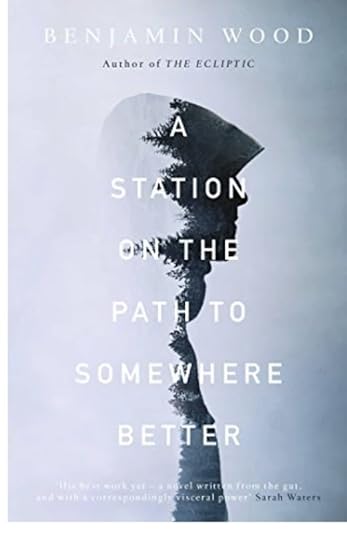
November 21, 2025
The Producers
The Producers at the Garrick Theatre
One of my favourite musicals, The Producers remains funny, original and daring — any Hitler-themed show is bound to cause a flicker of discomfort. This high-energy revival works brilliantly: the production roars along with brazen humour and theatrical excess, with Andy Nyman’s Max and Marc Antolin’s Leo especially strong.
The satire of staging a deliberate flop that becomes a hit still lands, though the material now feels a little dated in today’s cultural climate, making this revival more of a nostalgic romp than razor-sharp commentary.
Still, my friend and I laughed our teeth off. Catch it before it closes next September.
November 15, 2025
My review of I Deliver Parcel in Beijing
I Deliver Parcels in Beijing by Hu Anyán
I read the first six chapters in one go: I simply couldn’t put it down. The book has a raw authenticity. It recounts Hu Anyán’s years of working in China’s low-wage, high-pressure gig economy. Over two decades, he held 19 different jobs across six cities, from petrol-station attendant, shop assistant, and security guard to night-shift warehouse sorter and courier delivering parcels in Beijing.
Much of the book focuses on his time as a courier in the capital around 2018–19: twelve-hour days, a delivery every few minutes, earning only fractions of a yuan per parcel. He navigates endless construction sites, broken e-bike batteries, angry customers, and relentless competition among co-workers.
I was fascinated by his account. I knew life as a delivery worker was hard, but I hadn’t realised just how gruelling it could be. Hu writes in a reflective, often deadpan tone, describing the physical toll (“I sweated so much I never needed to pee”), the psychological strain, and the small moments of dignity amid drudgery. I was shocked by how many clients, mostly urban dwellers, treated him with contempt, even filing complaints over minor mistakes. In one case, a customer accused him of theft despite clear photo evidence that he had left the parcel in the designated locker. The company still deducted the item’s value from his wages while the case was being “investigated.”
Despite these vivid details, my enthusiasm dimmed as the book went on. The writing becomes repetitive, and the momentum falters. The narrative is divided into two main parts — his time as a courier and his earlier work experiences — but it lacks a dramatic arc. If I were to edit it, I’d weave the earlier stories through the main narrative rather than grouping them at the end.
When Hu eventually quits the delivery job, a few clients send him thank-you messages on WeChat, one calling him “the best delivery man.” That moment — simple yet profound — would have made a perfect ending, symbolising his craving for human recognition in an inhuman system. The prose isn’t great literature, but it contains flashes of brilliance: “Time is money, but money also devours time.”
“No one tells you that freedom in the gig economy means you are free to collapse whenever you like.”
Over all, I really enjoy reading this book. I Deliver Parcels in Beijing isn’t just about couriers or exploitation; it’s about the universal human desire for dignity and control over one’s own life, a quest for freedom that feels ever more elusive in a world ruled by speed, data, and invisible bosses.
Hu Anyán is deeply preoccupied with freedom, both as an idea and as a lived contradiction. I hope his newfound recognition as a writer and no doubt improved financial situation have granted him some measure of freedom at last, especially the spiritual kind.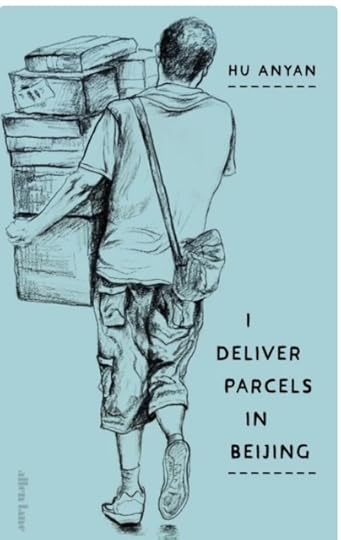
November 13, 2025
My review of Country Girl
Country Girl by Edna O’Brien
How I loved this book!
Irish novelist Edna O’Brien’s Country Girl is a candid and lyrical memoir tracing her journey from a strict, rural Catholic upbringing in County Clare to literary fame and cosmopolitan life in London and beyond.
O’Brien recounts her early years in a repressive Ireland of the 1940s and 1950s, marked by the dominance of the Church and by her father’s alcoholism and volatility. Against this backdrop, she discovers literature, love, and rebellion. Her early marriage to writer Ernest Gébler becomes both an escape and a prison as he resented her success after she published The Country Girls (1960), a novel that scandalised Irish society and was banned for its frank sexuality.
The memoir moves through O’Brien’s later decades in London, her encounters with literary and cultural figures such as Paul McCartney, Marlon Brando, Robert Mitchum, and Philip Roth — and her continuing devotion to writing. She writes of her difficult marriage, her fierce attachment to her sons, her loneliness, and her lifelong preoccupation with Ireland, which is both muse and wound. The book closes with her reflections on fame, desire, loss, and the act of writing itself.
I greatly admire its lyrical prose and emotional depth. O’Brien’s storytelling, elegant language, and self-awareness elevate her personal history into something universal — a woman’s struggle for creative and emotional freedom.
Although she reveals much, O’Brien remains somehow elusive and mysterious. Perhaps that’s as it should be.
Country Girl is a haunting, beautifully written life story, part confession, part elegy, and part love letter to Ireland and to literature itself. It stands as a testament to O’Brien’s courage, artistry, and her enduring belief in the redemptive power of words.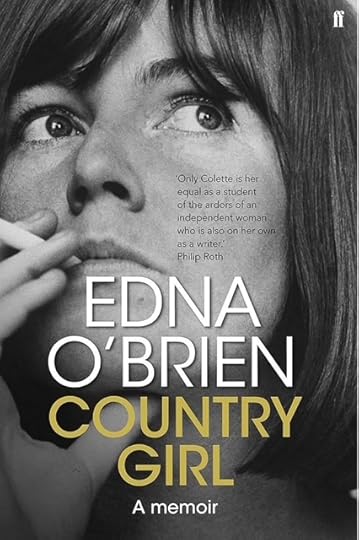
November 12, 2025
My review of Choral
I just saw The Choral, a very British film starring Ralph Fiennes, and thoroughly enjoyed it.
Set in 1916 in the fictional Yorkshire mill town of Ramsden, during the height of the First World War, The Choral follows a struggling choral society desperate to survive after many of its male singers have been conscripted or killed. They hire Dr Henry Guthrie (Ralph Fiennes), a refined yet somewhat alienated choirmaster who is regarded with local suspicion because of his time in Germany and his love of German culture. Guthrie proposes a bold performance of The Dream of Gerontius, Edward Elgar’s oratorio. The film tracks the choir’s attempts to recruit teenage and other non-traditional singers and explores themes of class, loss, love, hidden sexuality, and the trauma of war, as the community clings to normalcy through music.
The screenplay by Alan Bennett brings his trademark blend of wit, melancholy, and social observation, though to my mind the film lacks a little tension and flair. A Financial Times review aptly calls it “perfectly tuned, but it never soars.”
What saves the film is the layered and outstanding performance by Ralph Fiennes, one of my favourite actors. His portrayal of the choirmaster, a troubled eccentric, feels entirely authentic.
All in all, The Choral is a pleasure to watch, with its stirring music and beautifully detailed period costumes.
November 10, 2025
Not Wild enough
The Importance of Being Earnest at the Noël Coward Theatre
I’ve just seen the show in the West End. It was hard not to laugh and enjoy myself. Wilde’s famous lines were expertly delivered; the performances polished, the period costumes elegant, and there were plenty of laughs and camp humour. In fact, it borders on crowd-pleasing.
For my money, it is a little too faithful to the original, without much freshness or daring reinterpretation. The director played safe. Rather too safe. What saved the show was Stephen Fry’s outstanding turn as Lady Bracknell,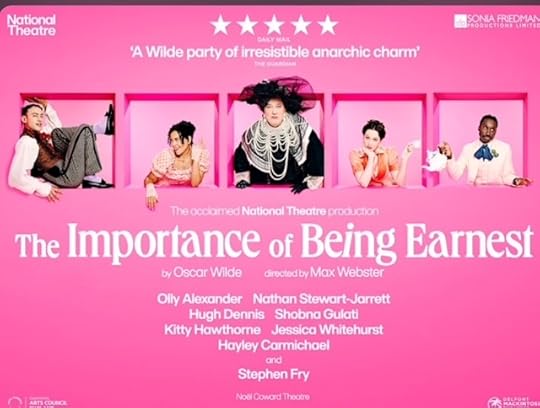
delivered with delicious sharpness and wit. It was worth seeing just for him.
November 8, 2025
Magical painting in Bhutan
Self-Risen Rock Paintings in Bhutan
Bhutan is such a magical place that sometimes magical things happen. Near Cheri Monastery, the country’s first monastic establishment, there is a striking rock painting of Phajo Dugom Zhigpo, one of Bhutan’s most revered saints. The image shows him seated in meditation, holding a vajra and bell, symbols of wisdom and compassion, surrounded by protective deities.
Rock paintings and carvings are common in Bhutan, placed at spiritually powerful sites to bless travellers and sanctify the land. Some of them, including this one, are believed to be “self-risen.” (I had to laugh when I first heard the term; the only thing I associated with “self-risen” was flour!) It means the image is said to have appeared miraculously, without human hands.
When I arrived on a sunny morning with my guide and driver, the golden bits of the painting gleamed in the light. Rather magical. Self-arisen? Not sure.
The story of Phajo Dugom Zhigpo is also fascinating. Born in Tibet, he was a highly gifted Buddhist practitioner of the Drukpa Kagyu lineage. Following a prophecy, he travelled to Bhutan through snow-caked passes in the early 13th century to spread the Drukpa teachings, which later became the country’s dominant Buddhist tradition.
Across cultures and throughout history, there have always been miracle stories. Immaculate Conception came to mind. Legends like self-risen rock paintings help create sacredness and strengthen religious authority.
November 7, 2025
My review of the painted veil
The Painted Veil by W. Somerset Maugham
“I am in the first row of the second-rate,” claimed the renowned British writer W. Somerset Maugham. Perhaps he was right.
Recently, I read his 1925 novel The Painted Veil. Though there is a great deal to admire, I also found obvious shortcomings.
Set in the 1920s, the novel follows the moral awakening of Kitty Fane, a beautiful but shallow young woman. She marries Walter, a kind but socially awkward bacteriologist, mostly to escape her overbearing mother. In Hong Kong, their marriage quickly becomes unhappy, and Kitty begins an affair with Charlie Townsend, a charming and married colonial official.
When Walter discovers the affair, he gives Kitty a brutal choice: accompany him to a remote Chinese village ravaged by cholera, or face public divorce and disgrace.
Kitty, abandoned by Charlie and with no other respectable option, reluctantly goes with Walter. In the impoverished village, among death and suffering, she unexpectedly finds a new sense of purpose. She volunteers at a convent-run orphanage and begins to mature, gaining compassion and humility. She realises Charlie’s selfishness and Walter’s quiet devotion too late.
Walter eventually dies of cholera, possibly from deliberate exposure, and Kitty returns to Hong Kong, pregnant and unsure if the child is Walter’s or Charlie’s. After resisting Charlie’s attempts to resume the affair, she resolves to start fresh, return to England, and raise her child with more integrity than she herself was raised.
The novel ends with Kitty, older in spirit, determined to escape her past and build a better future.
Intrigued, I also watched the film version and found it more satisfying than the book itself.
The Painted Veil, typical of Maugham’s work, is an engaging read. The situation is intriguing and the prose elegant. But it could have been so much better.
To start with, Kitty’s transformation takes place too quickly and too neatly. In real life, people don’t change like that.
Secondly, I found the author’s colonial gaze disturbing. All the local Chinese characters are silent. They feel like ornaments rather than real people.
Finally, both her husband and her lover are poorly drawn. Charlie is a caricature, and Walter—described as “kind”—gives his wife an astonishingly cruel ultimatum. As readers, we would have far more empathy if we understood his conflicted feelings and motivations. All in all, I was quite disappointed in the novel.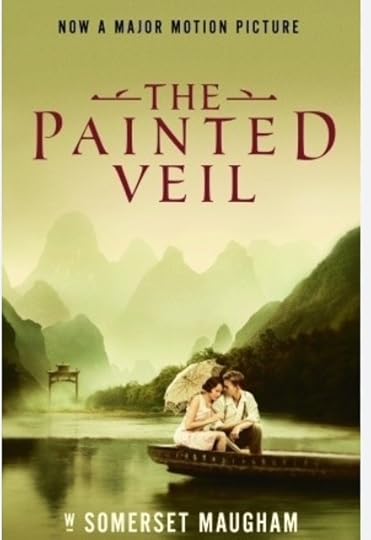
November 6, 2025
All Quiet on the Western Front
All Quiet on the Western Front by Erich Maria Remarque
I am slowly making my way through all the classics I promised myself to read before I kick the bucket. I am absolutely delighted to have read this powerful book, which shows the brutality of war from the perspective of an ordinary soldier.
All Quiet on the Western Front follows Paul Bäumer, a young German soldier who enlists in World War I with his classmates after being inspired by patriotic school propaganda. Once at the front, they quickly discover that war is not glorious at all, but brutal, random, and dehumanising.
Paul and his fellow soldiers endure bombardments, gas attacks, hunger, and constant fear. They lose their closest friends one by one. Paul becomes emotionally numb as he watches his generation destroyed physically and psychologically.
Near the end of the novel, his last surviving friends are killed. Finally, Paul himself dies on an unusually quiet day, with the army report noting only that “all quiet on the Western Front.” His face appears peaceful, as if relieved that the war is finally over for him.
The reading is not entirely bleak. There are the deep bonds between comrades, the warmth of family (his mother makes his favourite jam cakes), and joyful moments, such as catching and roasting a goose.
The author never explicitly states an anti-war position. Instead, he simply tells the truth about war. And the truth speaks for itself. I find the book painfully timely: there are still so many wars and conflicts around the world. I would recommend leaders such as Putin and Xi read this.



